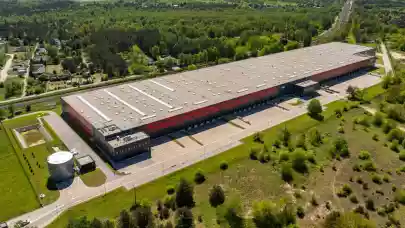
As we are seeing a slowing down of new office projects across Budapest and the region, occupancy has emerged as ‘king’, while energy efficiency has become the number one priority for both landlords and tenants. Property Forum asked Jake Lodge, Principal at Avison Young in Hungary about his view on the major changes in the local office market and the way landlords and tenants try to overcome mounting difficulties.
Avison Young entered the Hungarian market almost 2 years ago, in January 2021. How has your business developed since then?
In the context of the Covid pandemic followed by the war in Ukraine and the energy crisis, we are delighted with the development of our business since we began operations as a fully-fledged Avison Young brokerage firm in early 2021. Our efforts have initially been focused on the development of our three main businesses; asset management for third parties, office leasing and capital market advisory with all practices having performed extremely well, making a real impact on the market. We now want to develop further our project management capability, a department which has experienced strong and continuous growth since 2020, and is looking forward to building up the team in 2023. It’s been an honour and an enjoyable experience to have already been entrusted by key clients such as CA Immo, CODIC, CPI and Generali and we look forward to leveraging on this excellent foundation.

Jake Lodge
Principal
Avison Young in Hungary
The office market has faced several challenges in the last couple of years, including Covid and the ongoing energy crisis. How has the market weathered the storm in your opinion?
During these remarkable years, the office market has been heavily impacted. Total annual demand was above 630,000 sqm in 2019 and since then diminished to a level of ca. 330,000-360,000 sqm per annum. The office market nevertheless demonstrated resilience: for the most part, small and large tenants alike have continued to lease (and pay for) office space whilst they assess the long-term impact of the work-from-home (WFH) trend and general recovery from the pandemic. Very few companies have taken the bold step of maximizing WFH policies and sharply reducing their footprint; preferring the wait-and-see approach to the ‘new way of working’.
Besides this quantitative negative impact on demand, there is also a qualitative change as companies are now looking at increasing utilisation rates and gradually bringing their teams physically back together. As a consequence of the implementation of a hybrid solution, the requirements moved towards a lower density (fewer working stations and more communal space) encouraging communication and exchange among the staff when in the office.
How are landlords and tenants in Budapest handling skyrocketing energy prices? Do you expect to see more investments in improving energy efficiency?
Energy prices are making it extremely difficult for the F&B sector which had been already heavily hit by Covid. Otherwise, there has been a general maturity and understanding by tenants of the increasing costs nonetheless SME’s have been the most quizzical about these increases.
For some less prepared landlords, there has been a scramble to achieve energy efficiencies, but this has been a landlord’s basic obligation, embodied in the principles of the main green ratings like BREEAM and LEED, so there should be no excuses. A responsible landlord should already have put in place the main stalwarts of energy savings initiatives.
That said, the market is now facing a dilemma of polarization between modern, typically more efficient, buildings that have good cash generation to invest into further improving their operational efficiency and aged buildings that typically command lower rents & higher operating costs. Landlords of these aged buildings are under pressure to keep occupancy high due to void costs outstripping rental income which would otherwise reduce their financial capacity to modernise and upgrade their property. Their woes are further consolidated by banks targeting green lending which typically favours the more modern buildings.
There are predictions that energy bills might force some remote workers to return to offices. Are you seeing anything like that happening? How do you see the role of hybrid work going forward?
For sure, the low commuting costs in Budapest make travelling to work over heating your apartment a viable saving opportunity for some of the workforce. Under such rationale, we have seen public companies anticipate an employee push for a return to the office. This dovetails nicely into the trend that most business leaders now target a return to the office despite the pandemic time demonstrating that WFH can work. During the pandemic, Avison Young's research indicated that 83% of employers found that WFH successfully allowed continuity of business, and it was an important component to ensure talent retention during the post-pandemic hiring boom. We are now clearly moving away from survival mode and companies are keen to bring teams back into the office to promote collaboration, innovation, team building and career development.
Businesses are relying on landlords to help to return to the office by boosting employee experience; it’s not just a warm productive office but a social experience combined with all the services & amenities surrounding the workplace. This is going to be a key challenge for the office market as small enterprises and F&B are all under considerable pressure right now.
Are you observing more concessions added to lease contracts to retain existing tenants and attract new ones?
Currently, occupancy is seen as ‘king’. With the expected macroeconomic turbulence there is a real push for landlords to secure or retain large tenants asap and minimise vacancy, which costs are now having a significant impact on the property cash flow. This means that there is now more willingness to provide incentives; be it fit-out contributions or rent-free. Interestingly we have seen a gentle upward swing in headline rents for the more central and prominent buildings that typically have a plethora of amenities within their close vicinity.
What are your predictions in terms of future supply on the Budapest office market? Will we see new megaprojects anytime soon? Will South Buda take over from Váci Road as the most attractive office hub?
For sure we are seeing a slowing of new office projects. Total new supply will end up at around 310,000 sqm in 2022 whilst we should not see more than 160,000 sqm being delivered in 2023. Without any pre-leases secured, developers will struggle to launch mid-sized and mega projects alike as financing banks tighten their belts. Although weakened, we are not expecting the occupier market to collapse – Hungary has proven time and time again to be an excellent BPO and SSC location - the depreciation of the HUF vs USD and EUR only makes the country more competitive, at least on a cost basis - and the surge of strong local businesses will continue to ensure a diversified demand for office.
We expect to witness a continued gradual development of the South Buda market through the development of existing projects which shall complement the Váci corridor. We don’t see this having a deterioration effect on the Váci Corridor, its excellent accessibility will continue to be a favourite among tenants. Come what may, Avison Young anyhow looks forward to dynamically servicing its clients, no matter which direction the market takes!



